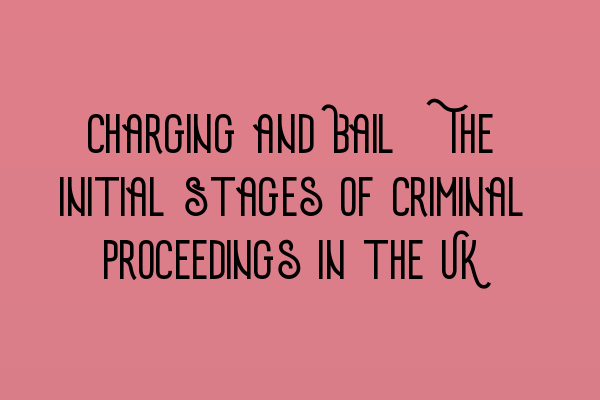Charging and Bail: The Initial Stages of Criminal Proceedings in the UK
When facing criminal charges in the UK, it is essential to understand the initial stages of the criminal proceedings. These stages, which include charging and bail, are crucial to the overall outcome of a criminal case. This blog post will delve into the intricacies of charging and bail, shedding light on their importance and providing a comprehensive overview of these initial stages.
Charging: The First Step in Criminal Proceedings
The process of charging refers to the formal accusation made against an individual for a particular criminal offense. A charge is typically issued by the police or other investigative agencies based on evidence gathered during their investigation. It is important to note that a charge does not imply guilt, but rather signifies the commencement of legal proceedings.
Following a charge, the defendant will be notified of the specific offense they are being accused of. The charge will outline the nature of the offense, the place and time of its alleged occurrence, and any aggravating factors. It is during this stage that individuals should seek legal representation to defend their rights and navigate the criminal justice system effectively.
The SQE 1 Practice Exam Questions and SQE 1 Practice Mocks FLK1 FLK2 articles on our website can provide valuable insights into the types of legal questions you may encounter during this stage.
Bail: Ensuring Freedom Pending Trial
After being charged, a defendant may be detained or granted bail depending on various factors such as the seriousness of the offense, the defendant’s criminal history, and the risk of flight or interference with the investigation. Bail aims to strike a balance between the defendant’s right to freedom and ensuring their presence at trial.
If granted bail, the defendant will be released from custody under certain conditions set by the court. These conditions may include regular reporting to a police station, surrendering travel documents, or the imposition of a curfew. Failure to abide by these conditions can result in the revocation of bail.
The SQE 2 Preparation Courses and SQE 1 Preparation Courses articles on our website offer comprehensive resources to help aspiring solicitors prepare for the legal profession and gain a deeper understanding of the complex aspects of criminal law, including the process of granting bail.
Conclusion
The initial stages of criminal proceedings in the UK, namely charging and bail, play a vital role in shaping the outcome of a criminal case. Understanding the implications of being charged, seeking legal representation, and navigating the complexities of the bail process are essential for anyone facing criminal charges.
To stay informed about important dates and deadlines related to the SRA SQE exams, you can refer to our article on SRA SQE Exam Dates. Empower yourself with knowledge and make informed decisions as you progress through the criminal justice system.
